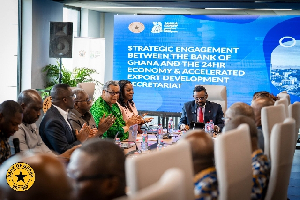A total of ?407.1bn debt has been cancelled by multilateral donors since February this year when the country reached the decision point under the Heavily Indebted Poor Countries (HIPC) initiative.
The benevolent donors include the International Development Agency (IDA), African Development Bank/African Development Fund (AFDB/ADF) and the International Monetary Fund (IMF). Negotiations are ongoing with other bilateral and commercial creditors to concluded and sign the relevant relief agreements with them too.
The Minister of Finance, Yaw Osafo-Maafo, said these in a speech read for him on Monday at the opening of a two-day inter-governmental consultation between Ghana and Germany in Accra. He said as at October this year, the main HIPC account had been credited with over ?400bn.
Subsequently, over ?117bn have been approved by government for immediate disbursement to district assemblies and various agencies for poverty reduction activities especially in the education, health, water and sanitation sectors.
Osafo-Maafo stated further that an additional ?60bn had been approved for reduction in the interest payments on domestic debts. He disclosed that since independence, Ghana had received about 860m Euro in terms of both financial and technical assistance from Germany.
The minister acknowledge that the management of the economy over the years had been confronted with several challenges including higher-than-expected payments of wages and salaries, external shocks resulting from high world prices of crude oil and higher-than-expected subsidies by utility companies including VRA.
“In spite of these challenges, the government, through the adoption of prudent fiscal and monetary policies, has been able to maintain the macro-economic stability achieved last year at a great political cost,” he said.
Osafo-Maafo noted that the total domestic expenditure was slightly above the target of 0.6 per cent of GDP while domestic revenue generation had been quite robust exceeding the programmed target by 1.3 per cent of GDP. He said that inflation had remained on a downward trend, declining from 21 per cent last year to 12.9 per cent this year as compared to the 13 per cent GDP.
The German Ambassador, Harold Loeschner, said that Ghana had political stability and peace, a situation which he said had placed Ghana in a position to merit cooperation and support which Germany was ready to offer to the country in all endeavours.
Loescher said that Germany would intensify her cooperation in the private sector to attract German investors into the country. The leader of the German investors into the country.
The leader of the German delegation, Dr Andreas Pfeil, noted that poverty eradication was the overall goal of Germany’s development policy. “Germany supports any measure that leads to democratic transparency and capable institutions of private sector,” he said
General News of Tuesday, 3 December 2002
Source: Ghanaian Times












